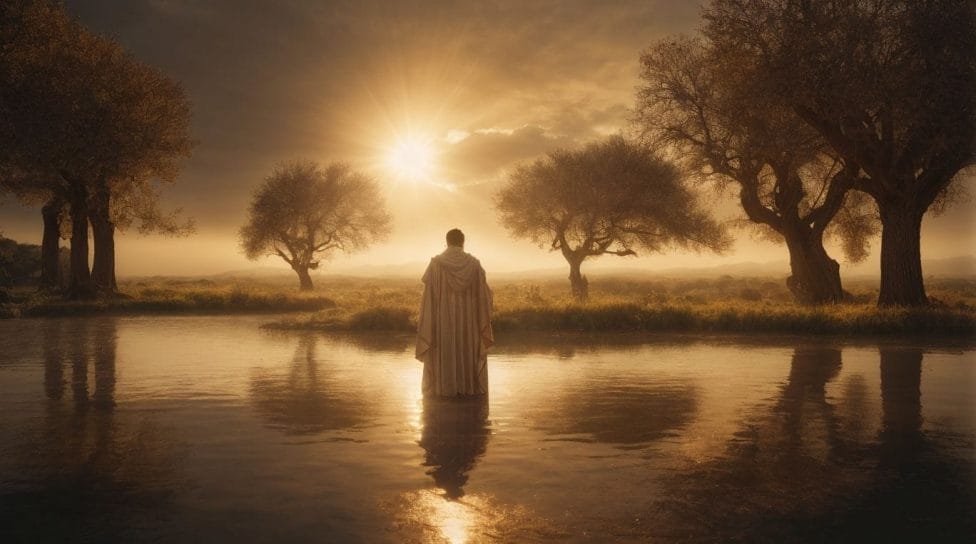Christianity, one of the world’s major religions, has a rich and intricate origin story. It traces its roots back to the life and teachings of Jesus Christ in the 1st century CE. The origins of Christianity can be divided into different periods, each playing a significant role in shaping the faith and its spread across the world.
The life of Jesus Christ forms the foundation of Christianity. His teachings emphasized love, compassion, and salvation, which attracted a group of devoted followers known as the early Christians.
During the Roman Empire, Christianity began to gain traction and spread throughout the region. The Apostle Paul played a pivotal role in this expansion as he traveled widely, establishing Christian communities and spreading the message of Christ.
However, the early Christians faced persecution and martyrdom due to their beliefs. Despite this, the faith continued to thrive and gain followers.
Several key locations hold significant importance in the origins of Christianity. Jerusalem is the birthplace of Christianity, where Jesus preached, and pivotal events like the Last Supper and Crucifixion occurred. Bethlehem, the birthplace of Jesus, holds great significance, as does Rome, which became the center of Christianity’s expansion under Emperor Constantine.
Ephesus, an ancient city in present-day Turkey, was also a hub of early Christian activity, with the Apostle Paul establishing a community there.
The impact and influence of Christianity cannot be overstated. Today, Christianity is the largest religion in the world, with a profound presence in various spheres. It has been pivotal in shaping Western civilization, contributing to art, literature, philosophy, and ethics. Furthermore, Christianity has spread to other continents, adapting to different cultures and leaving an indelible mark on their histories.
Understanding the origins and evolution of Christianity is crucial for appreciating its wide-ranging impact, both in the modern world and throughout history.
Key Takeaways:
- Christianity originated in Jerusalem: Jerusalem is considered the birthplace of Christianity, where Jesus Christ lived, taught, and was crucified.
- Early Christian activity in Bethlehem: Bethlehem holds historic importance as the birthplace of Jesus, making it an important location in the origins of Christianity.
- Rome played a vital role in the expansion of Christianity: Rome became the center of Christianity’s growth and influence during the spread of the religion in the Roman Empire.
The Origins of Christianity

Photo Credits: 777Legion.Com by Austin Walker
The Origins of Christianity take us back to the life of Jesus Christ and the early followers who played a pivotal role in shaping this influential religion. Delve into Jesus’s life and explore this faith’s beginnings, understanding its historical and cultural significance. Learn about the journey of Jesus and the impact it had on his devoted followers as we uncover the fascinating story behind the origins of Christianity.
The Life of Jesus Christ
The Life of Jesus Christ is a fundamental aspect of the origins of Christianity. It is imperative to understand the key events that shaped his life. Here is a comprehensive overview:
| Birth | Born in Bethlehem to Mary and Joseph |
| Ministry | I started preaching and performing miracles at the age of 30 |
| Disciples | Gathered a group of followers known as the Twelve Apostles |
| Teachings | Shared parables, teachings, and the Sermon on the Mount |
| Crucifixion | He was arrested, crucified, and died on the cross |
| Resurrection | Rose from the dead after three days |
Comprehending The Life of Jesus Christ is key to fully understanding the foundations of Christianity. His teachings, actions, and ultimate sacrifice form the basis of the beliefs and practices of millions of Christians worldwide. By studying the life of Jesus, individuals can gain profound insight into the core principles and values of the faith.
The Early Followers of Jesus
The Early Followers of Jesus played a crucial role in the origins and spread of Christianity. They were the ones who witnessed Jesus’ teachings, miracles, and resurrection firsthand, which led to their strong belief and commitment to spreading his message. These followers, known as disciples or apostles, included Peter, John, James, and others mentioned in the New Testament. They traveled extensively, preaching and establishing communities of believers in various regions. Despite facing persecution and martyrdom, their devotion and dedication paved the way for Christianity to become a global religion. Today, their legacy continues to inspire and guide millions of Christians worldwide.
The Early Followers of Jesus were instrumental in shaping the foundation of Christianity and spreading its message across the Roman Empire and beyond. Their unwavering faith and sacrifice have left a lasting impact on the world.
Christianity Spreads in the Roman Empire

Photo Credits: 777Legion.Com by Billy Nguyen
Christianity’s remarkable expansion in the Roman Empire unraveled through significant contributors and intense struggles. Discover the influential role of the Apostle Paul and the enduring legacy of his teachings. Journey through the perils faced by early Christians, as persecution and martyrdom threatened their faith. Experience the triumphs and tribulations that shaped the spread of Christianity across the Roman Empire, a captivating tale spanning devotion, resilience, and the pursuit of spiritual truth.
The Role of the Apostle Paul
The role of the Apostle Paul, also known as Saul, played a significant part in the spread and establishment of Christianity. His zealous persecution of early Christians changed dramatically when he had a divine intervention on the road to Damascus. From that transformative moment, Paul became a dedicated follower of Jesus, devoting his life to preaching and teaching about Christ. In addition to his spiritual journey, Paul also had a practical role in establishing Christian communities, writing epistles, and defending Jesus’s teachings to Jews and Gentiles. Through his efforts, Christianity expanded beyond its Jewish origins and became an influential force in the early Christian Church.
Persecution and Martyrdom
During the early years of Christianity, followers faced severe persecution and martyrdom. This targeted violence aimed to suppress the spread of the new faith. Here is a table showcasing some notable instances of persecution and the martyrs associated with them:
| Persecution | Martyr |
| Nero’s Persecution (64 AD) | Saint Peter and Saint Paul |
| Decian Persecution (250 AD) | Saint Fabian and Saint Cyprian |
| Diocletian Persecution (303 AD) | Saint Agnes and Saint Sebastian |
Fact: Despite the persecution and martyrdom, Christianity continued to thrive and spread, eventually becoming the dominant religion of the Roman Empire and leaving a lasting impact on Western civilization.
Key Locations in the Origins of Christianity

Photo Credits: 777Legion.Com by Joseph Allen
Discovering the origins of Christianity takes us on a journey through key locations that played significant roles in shaping this influential faith. From the birthplace of Christianity in Jerusalem to the pivotal city of Rome, where Christianity flourished and spread, each destination holds its unique story. We’ll also explore Bethlehem, the birthplace of Jesus, and Ephesus, a vibrant hub of early Christian activity. Join us as we delve into the rich historical tapestry of these important locations, unveiling the foundations of Christianity.
Jerusalem: The Birthplace of Christianity
Jerusalem holds immense historical and religious significance as the birthplace of Christianity. In the streets of this ancient city, Jerusalem, The Birthplace of Christianity, Jesus lived, preached, and ultimately faced crucifixion and resurrection. Jerusalem became the center of early Christian activity as Jesus’ disciples and followers, empowered by the Holy Spirit, spread his teachings and established the early Christian community. The city remains a pilgrimage site for Christians worldwide, with important landmarks such as the Church of the Holy Sepulchre and the Via Dolorosa, which trace the steps of Jesus during his final journey. Jerusalem’s profound influence on the origins and development of Christianity cannot be understated.
Bethlehem: The Birthplace of Jesus
Bethlehem: The Birthplace of Jesus holds immense significance as the birthplace of Jesus, a central Christian figure. The biblical account states that Jesus was born in a humble manger in Bethlehem. Today, this city attracts numerous Christian pilgrims who come to connect with the origins of their faith. When visiting, individuals can explore the Church of the Nativity, which is believed to be the exact location where Jesus was born. They can also visit the nearby Shepherds’ Field, where the shepherds received news of his birth. Bethlehem remains a profoundly meaningful destination for Christians worldwide, symbolizing Jesus’ humble beginnings and his message of love and salvation.
Rome: The Center of Christianity’s Expansion
As the center of Christianity’s expansion, Rome played a pivotal role in the growth and spread of the faith. As the Roman Empire’s capital, it served as a prominent hub for disseminating Christian teachings. The presence of influential early Christian leaders, including the Apostle Paul, greatly contributed to the organization and expansion of Christianity. Rome’s central location allowed missionaries to easily travel and establish new Christian communities in various parts of the empire. Furthermore, the conversion of Emperor Constantine to Christianity and the subsequent acceptance of the religion as the empire’s official faith solidified Rome’s significance in the history of Christianity.
One compelling example of Rome’s profound influence on Christianity is the martyrdom of two early Christian saints, Peter and Paul. These courageous individuals were executed in Rome due to their unwavering religious beliefs, making them enduring symbols of faith and dedication to the Christian cause. Their ultimate sacrifices continue to inspire believers across the globe.
Ephesus: A Hub of Early Christian Activity
Ephesus was a significant hub of early Christian activity, playing a pivotal role in spreading and developing the faith. As it is located in present-day Turkey, Ephesus was a prosperous city and a cultural center in the ancient world. It was blessed by the visit of the Apostle Paul, who played a crucial role in establishing and growing Christian communities. Notably, the city housed one of the Seven Wonders of the Ancient World, the Temple of Artemis, which greatly influenced religious practices in the region. Ephesus emerged as a paramount center for Christian worship, witnessing the construction of remarkable church buildings and hosting important early Christian councils. The rich history of Ephesus as a hub of early Christian activity continues to captivate scholars and believers alike.
The Impact and Influence of Christianity

Photo Credits: 777Legion.Com by Albert Baker
Discover the profound impact and enduring influence of Christianity in the world. Delve into the sub-sections that will shed light on Christianity’s role in shaping Western civilization, its spread to other continents, and its relevance in the modern world. Uncover fascinating facts, figures, and events that highlight the far-reaching reach of this influential faith. Prepare to be intrigued and enlightened by the powerful impact of Christianity throughout history and across different cultures.
Christianity in the Modern World
Christianity in the modern world has an immense impact. It is one of the world’s largest religions, with billions of followers worldwide. The spread of Christianity in the Modern World has resulted in the establishment of churches, charities, and educational institutions around the globe. In the modern era, Christianity in the Modern World plays a crucial role in shaping societies and influencing moral values. It continues to serve as a source of spiritual guidance and a catalyst for positive change. From providing social services to promoting peace and justice, Christianity in the Modern World remains relevant and impactful in addressing the challenges of the contemporary world. The teachings of Christ and the values endorsed by Christianity in the Modern World continue to shape individuals and communities, making it an essential part of today’s global landscape.
Christianity’s Role in Western Civilization
Christianity’s Role in Western Civilization has significantly shaped various aspects of society throughout history. Its influence can be seen in moral values, legal systems, social customs, art, literature, and education. By establishing institutions such as churches, monasteries, and universities, Christianity’s Role in Western Civilization was critical in preserving and advancing knowledge during the Middle Ages. Moreover, it has made notable contributions to the development of modern science, the promotion of human rights, and the cultivation of individualism. The fundamental teachings of Christianity, including compassion, forgiveness, and equality, have profoundly influenced Western societies and continue to impact individuals and communities today.
An exemplar of the impact of Christianity’s Role in Western Civilization is evident in a true story from World War II. The Confessing Church, a group of Christian theologians and pastors in Germany, stood bravely against Nazi ideology and actively resisted the regime. Despite the risks, they demonstrated unwavering commitment to the values they held dear, including the dignity and worth of every human being. This courageous stance by the Confessing Church exemplifies how Christianity’s Role in Western Civilization, as a guiding force, can inspire individuals and communities to boldly advocate for justice, truth, and the well-being of all people.
Christianity’s Spread to Other Continents
Christianity’s spread to other continents was a significant development in the religion’s history. As missionaries and explorers ventured beyond Europe, they carried the message of Christianity to new lands. In Africa, Christianity took root in regions like Egypt and Ethiopia, where it flourished and shaped local cultures. In Asia, missionaries introduced Christianity to countries like India, China, and Korea, which has had a profound impact. The Americas also saw the spread of Christianity, particularly through European colonization. Today, Christianity is practiced on every continent, making it a truly global religion. Pro-tip: When learning about Christianity’s spread to other continents, explore how it has adapted and blended with local cultures.
Facts:
Some Facts About the Origins of Christianity:
- ✅ Christianity originated after Jesus’ resurrection, as recorded in the New Testament.
- ✅ The place of origin is believed to be Jerusalem, where Jesus’ disciples first started believing in Him.
- ✅ Scholars suggest Jerusalem as the most plausible place of origin, although Judaea or Caesarea are also considered.
- ✅ The term “Christian” was first used in Antioch, but Christianity had already begun before that.
- ✅ The Day of Pentecost was a significant event in the early days of Christianity, with the Holy Spirit descending and Peter preaching the gospel.


